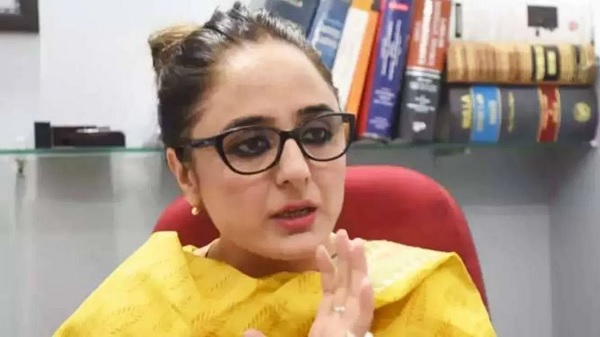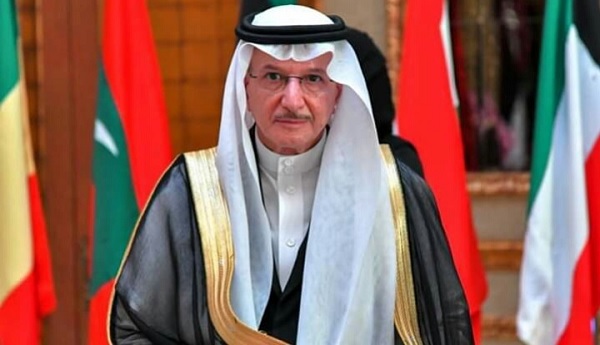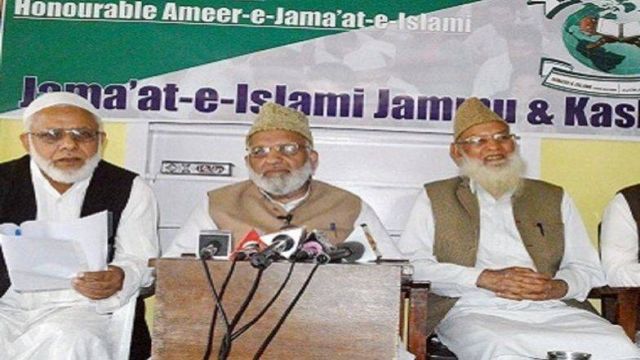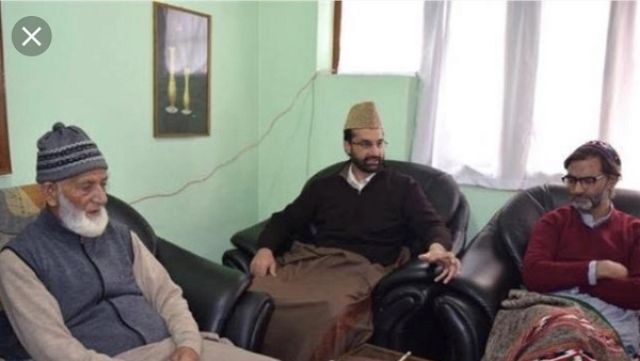
by admin | May 25, 2021 | Corporate

Advocate Deepika Singh Rajawat.
JAMMU – The Jammu and Kashmir Police on Monday booked an advocate for hurting the ‘religious sentiments’ of a community. Police sources said advocate Deepika Singh Rajawat has been booked under sections 295A and 505 (b) (2) of the IPC for creating enmity and hatred between different classes of people.
Rajawat, who shot to fame in 2018 for representing the 8-year-old Asifa’s family in the Kathua rape-and-murder case, had last week expressed fears that she could be attacked after several right-wing groups were outside her house to protest against her tweet.
In the tweet, on October 19, Rajawat posted a cartoon showing a man touching the feet of the deity during Navratri and the same man holding both the legs of a woman during the rest of the days and captioned it ‘Irony’.
The tweet drew outrage from the Hindutva activists claiming that she had targeted the Hindu community. Several members of right-wing organisations gathered around her house in Jammu and shouted threatening slogans against her. She had to seek police help to disperse the mob.
In her response, Rajawat said that her intention was not to hurt the religious sentiments of Hindu brothers and sisters as she was herself Hindu and observing Navratri. She told the media that she was trying to highlight the hypocritical approaches towards women in society as she had been witnessing sexual crimes against women daily.
Police sources said action would be taken after the cyber cell reports on the origin of the tweet and other technical details.
Asifa, the 8-year old tribal Bakarwal (Goatherd) girl, was kidnapped, sedated and repeatedly raped and later murdered in the Rasana village in Jammu’s Kathua district in 2018. Rajawat represented the family of Asifa. The case was tried in the district and sessions court in neighbouring Pathankot town of Punjab.
All the accused were subsequently sentenced by the trial court in this heinous crime that shook the entire nation.
Two of the then BJP ministers had joined rallies in support of the accused. Both the ministers were later dropped from the then PDP-BJP coalition government headed by Mehbooba Mufti for their support to the accused.

by admin | May 25, 2021 | Muslim World

OIC Secretary General, Dr. Yousef Al-Othaimeen
New Delhi : The Organisation of Islamic Cooperation (OIC) has criticised India’s new domicile law, calling it a measure to alter the demographics of and undermine the rights of people of Jammu and Kashmir.
In a release the OIC hailed the law as “baseless”. “The General Secretariat [of OIC] reaffirmed the importance of complying with international law and UN Security Council resolutions, considering the recent notification of ‘Jammu and Kashmir Grant of Domicile Certificate (Procedure) Rules 2020’ as baseless, running counter to international law and UN Security Council resolution 122” the release read.
The OIC maintained that it reaffirms its solidarity with the people of Jammu and Kashmir. It also called on the international community to gear up its efforts to resolve the Jammu and Kashmir dispute in accordance with the relevant UN Security Council resolutions and as per the aspirations of the Kashmiri people.
The Jammu and Kashmir administration has enacted the domicile law easing conditions for people to get domicile rights in the disputed region. This comes after New Delhi abrogated the region’s semi-autonomous status, which had allowed the regional government to restrict people of mainland India to have domicile rights there.

by admin | May 25, 2021 | News
“They have not just scrapped Article 370, Article 35-A, but also divided the state. This government has decapitated India. Jammu and Kashmir was the head of India… Jammu Kashmir ka tukde tukde kar diya (they have broken the state into pieces),” he said as the government moved four bills in Rajya Sabha to reorganise Jammu and Kashmir. The state will now be bifurcated into two union territories – Jammu and Kashmir and Ladakh.
“These people (the BJP) have come to power lately. They do not know… have not considered the strategic aspects… we have a long border with China, we have a border with Pakistan and with Pakistan Occupied Kashmir… to play around with border state, its people… it is being a traitor to the country,” Mr Azad said.
In a border state, one cannot stop the enemy just with the help of the armed forces, Mr Azad said. “You need the cooperation of the people too,” he said, pointing out that in 1947, the people had fought back the Pakistani intruders just armed with sticks.
“Jammu and Kashmir has a different culture, it is different geographically, culturally… it has three regions. In Jammu there is 60 per cent Hindus and 40 per cent Muslims. It is Article 370 that kept this state together,” Ghulam Nabi Azad said.
The Congress is opposing the government’s move along with a handful of other parties – including Omar Abdullah’s National Conference and Mehbooba Mufti’s People’s Democratic Party.
The rest – including Arvind Kejriwal’s Aam Aadmi Party, Mayawati’s Bahujan Samaj Party, the Telangana Rashtra Samithi, the ruling YSR Congress of Andhra Pradesh, and Naveen Patnaik’s Biju Janata Dal – are supporting the government.

by admin | May 25, 2021 | News, Politics
 By Sheikh Qayoom,
By Sheikh Qayoom,
Srinagar : For Jamaat-e-Islami (JI) Jammu and Kashmir the ban imposed on the socio-political religious organisation by the union government is not the first and perhaps not the last.
The government on Thursday declared the JI Jammu and Kashmir as “an unlawful association whose activities have the potential of disrupting the unity and integrity of India”.
Before imposing the five-year-long ban, more than 250 leaders and cadres of the organisation were picked up by police during nocturnal raids throughout the Valley.
After lodging them in local police stations, many senior leaders of the JI have been shifted to the central jail in Srinagar city.
The Joint Resistance Leadership (JRL), the separatist conglomerate headed by Syed Ali Geelani, Mirwaiz Umer Farooq and Muhammad Yasin Malik, called for post Friday prayer protests against the ban.
The authorities reacted by imposing restrictions in parts of Srinagar city to prevent any protests.
The ban order has been criticised by some mainstream politicians, including former Chief Minister Mehbooba Mufti.
Mehbooba said: “Democracy is a battle of ideas. The crackdown, followed by the banning of Jammat Islami is condemn able and another example of high handedness and muscular approach of the GOI (Govenment of India) to deal with the political issue of J&K”.
Separatist leaders in both the Syed Ali Geelani headed group and Mirwaiz Umer headed Hurriyat group have condemned the ban with one voice.
The authorities have placed Mirwaiz Umer under house arrest while Geelani continues to be under house arrest in Srinagar city.
Muhammad Yasin Malik is also under preventive detection.
JI Jammu and Kashmir is distinct from Jamaat-e-Islami Hind that was founded in 1948 as an Islamic organisation, but finally split into three offshoots in India, Pakistan and Bangladesh.
The founder of the Jamaat-e-Islami Hind, Sayyid Abul Ala Maududi, however, continues to the beacon light for the JI J&K as well.
The JI was first banned in 1975 during the emergency for opposing the Indira-Abdullah accord that finally brought back the National Conference (NC) founder, Sheikh Muhammad Abdullah, into mainstream politics.
The organisation was again banned by the central government headed by V.P.Singh in 1990. That order was revoked in 1993 by the P.V. Narasimha Rao headed Congress government.
JI leaders, including Muhammad Yusuf Shah, who later became the supreme commander of the Hizbul Mujahideen outfit in his new avatar as Syed Salahudin, fought the 1987 assembly elections with other leaders who opposed the NC under the banner of the Muslim United Front (MuF).
It is generally believed that many JI candidates, including Muhammad Yusuf Shah were defeated by a false declaration of results.
Senior JI leader Geelani, however, won the 1987 assembly elections repeating his victories in 1972 and 1977.
Geelani has been a part of the state’s electoral process till the JI decided to say goodbye to mainstream politics after 1990.
Many people believe that the single biggest reason for the JI cadres supporting militancy and separatism was their engineered defeat during the 1987 elections.
After ending their association with electoral politics, senior JI leaders supported the state’s merger with Pakistan, although the JI cadres did not initially pick up weapons to join the armed struggle till militancy took the centre stage in the Valley in 1989.
Since the pro-azadi Jammu and Kashmir Liberation Front (JKLF) advocated an
independent state free from both India and Pakistan, the Hizbul Mujahideen (HM) that had a predominant number of youth belonging to families of JI cadres was formed in September 1989.
HM stands for state’s merger with Pakistan.
After the HM was formed, the official crackdown on JI-run schools and other
organisations involved in fund raising started.
Geelani, who heads his faction of the separatist Hurriyat group, has formed his own organisation called the Tehreek-e-Hurriyat, but continues to wield both respect and influence in the JI.
(Sheikh Qayoom can be reached at sheikh.abdul@ians.in)
—IANS

by admin | May 25, 2021 | News, Politics
 Jammu : Security cover of 18 separatist leaders and 155 Jammu and Kashmir politicians has been withdrawn in the aftermath of the Pulwama attack on February 14 in which over 40 CRPF troopers were killed.
Jammu : Security cover of 18 separatist leaders and 155 Jammu and Kashmir politicians has been withdrawn in the aftermath of the Pulwama attack on February 14 in which over 40 CRPF troopers were killed.
An order issued by the Home Department late on Wednesday said security cover of separatists and some mainstream politicians was also being withdrawn/downgraded apart from those that were initially withdrawn on February 18.
As per the new order, the new list includes names from the National Conference, Peoples Democratic Party (PDP), Bharatiya Janata Party and the Congress.
Some of them are Hurriyat leader Syed Ali Shah Geelani, Jammu Kashmir Liberation Front (JKLF) chief Yasin Malik, former IAS officer Shah Faesal and PDP leader Waheed Para.
“Over 1,000 personal security guards and 100 vehicles provided to the secured persons are being withdrawn,” officials said here.
The security cover of four senior separatist leaders — Mirwaiz Umer Farooq, Shabir Shah, Professor Abdul Gani Bhat and Bilal Lone were already withdrawn on Monday.
The decision to cut down heavily on separatist leaders’ cover was taken in the aftermath of the Pulwama attack when an explosive-packed SUV rammed into a bus of a Central Reserve Police Force convoy on the Jammu-Srinagar highway killing 40 paramilitary troopers on the spot in the worst-ever terror attack in the state since militancy struck there in 1989.
—IANS





